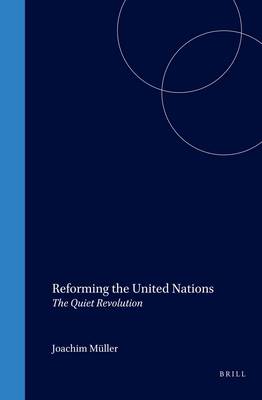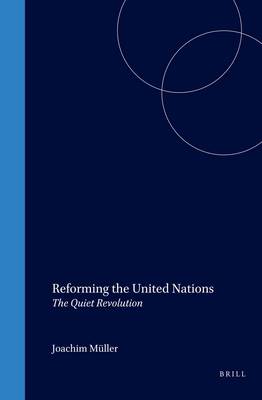
- Afhalen na 1 uur in een winkel met voorraad
- Gratis thuislevering in België vanaf € 30
- Ruim aanbod met 7 miljoen producten
- Afhalen na 1 uur in een winkel met voorraad
- Gratis thuislevering in België vanaf € 30
- Ruim aanbod met 7 miljoen producten
Zoeken
Reforming the United Nations
The Quiet Revolution
€ 822,95
+ 1645 punten
Omschrijving
The context in which the United Nations operates is one of change and reorientation: change in the political climate, resulting in changes in the tasks the organisation is called upon to undertake; reorientation of the organisation's internal structures and procedures in response to these changes. The principal goals and objectives of the United Nations have recently been reassessed. This reassessment - highlighted in the Reform Agenda of Secretary-General Kofi Annan and during the Millennium Summit - has led to a reaffirmation by the 189 Member States of their belief in the organisation. New forms of consensus and co-operation are developing regarding what the United Nations should be striving to achieve and how best it should be organised to improve its operations.
The UN and Kofi Annan "were awarded the Nobel Peace Prize for their role in reforming the 56-year-old institution ..." (Herald Tribune, Honor Awarded to Annan and UN, October 13-14, 2001, p. 1). The Quiet Revolution is essentially about the reform efforts of Kofi Annan. The book therefore describes a major part of his activities leading to the award.
"Dr. Joachim Müller presents a detailed review of the reform initiatives undertaken during the period from 1996 to 2000, which was of such importance for the evolution of the United Nations. A wealth of information from primary sources is provided, together with an informative analysis of the history of reform within the United Nations since its creation." - From the foreword by Jean-Pierre Halbwachs, Assistant Secretary-General, Controller, United Nations
Also by Joachim Müller: Reforming the United Nations: New Initiatives and Past Efforts, a three-volume set containing 50 key reform proposals originating inside and outside the United Nations.
The UN and Kofi Annan "were awarded the Nobel Peace Prize for their role in reforming the 56-year-old institution ..." (Herald Tribune, Honor Awarded to Annan and UN, October 13-14, 2001, p. 1). The Quiet Revolution is essentially about the reform efforts of Kofi Annan. The book therefore describes a major part of his activities leading to the award.
"Dr. Joachim Müller presents a detailed review of the reform initiatives undertaken during the period from 1996 to 2000, which was of such importance for the evolution of the United Nations. A wealth of information from primary sources is provided, together with an informative analysis of the history of reform within the United Nations since its creation." - From the foreword by Jean-Pierre Halbwachs, Assistant Secretary-General, Controller, United Nations
Also by Joachim Müller: Reforming the United Nations: New Initiatives and Past Efforts, a three-volume set containing 50 key reform proposals originating inside and outside the United Nations.
Specificaties
Betrokkenen
- Uitgeverij:
Inhoud
- Aantal bladzijden:
- 968
- Taal:
- Engels
- Reeks:
- Reeksnummer:
- nr. 4
Eigenschappen
- Productcode (EAN):
- 9789041116444
- Verschijningsdatum:
- 1/06/2001
- Uitvoering:
- Hardcover
- Formaat:
- Genaaid
- Afmetingen:
- 160 mm x 240 mm
- Gewicht:
- 1450 g

Alleen bij Standaard Boekhandel
+ 1645 punten op je klantenkaart van Standaard Boekhandel
Beoordelingen
We publiceren alleen reviews die voldoen aan de voorwaarden voor reviews. Bekijk onze voorwaarden voor reviews.







